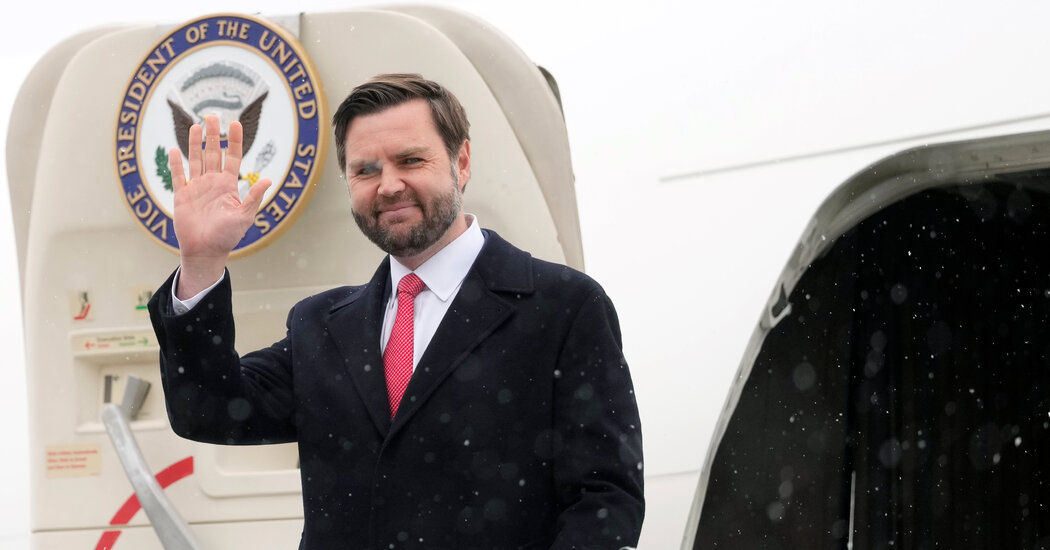The American vice president visited a concentration camp on Thursday afternoon. He laid a wreath at the foot of a statue, made the sign of the cross and paused before a memorial wall where in multiple tongues, including German and English, the words “Never Again” were written.
JD Vance told reporters he had read about the Holocaust in books, but that its “unspeakable evil” was driven home by his trip to Dachau, where more than 30,000 people died at the hands of the Nazis. “It’s something that I’ll never forget, and I’m grateful to have been able to see it up close in person,” Mr. Vance said.
But after Mr. Vance spoke in Munich the next day, Germany’s leaders effectively questioned if he had understood what he had just seen.
Eighty years after American soldiers liberated Dachau, top German officials this weekend all-but accused Mr. Vance — and by extension, President Trump — of boosting a political party that many Germans consider to be dangerously descended from Nazism.
That party, called the Alternative for Germany, or AfD, is sitting second in the polls for next Sunday’s parliamentary elections, with about 20 percent of the public saying they support it. But no other German party is willing to govern with it. That’s because the AfD has at times downplayed Hitler’s atrocities. Some party members have reveled in Nazi slogans.
German intelligence agencies have classified parts of the AfD as extremist. Members have been arrested in connection with multiple plots to overthrow the government. Some reportedly attended last year at a gathering that included discussions of deporting not only asylum seekers, but German citizens who immigrated to the country.
“A commitment to ‘never again’ is not reconcilable with support for the AfD,” Chancellor Olaf Scholz said in Munich on Saturday morning, as part of a lengthy rebuke of Mr. Vance.
“This ‘never again’ is the historical mission that Germany as a free democracy must and wants to continue to live up to every day,” he said. “Never again fascism, never again racism, never again war of aggression.”
Decades of German law and political practice have revolved around the belief that to prevent another Hitler from coming to power, the government must ban hate speech and shun political parties deemed extreme. The nation has an Office for the Protection of the Constitution, with intelligence tools to monitor extremists, and a constitutional court that in rare cases can ban parties entirely.
Mr. Vance, like another Trump administration official, Elon Musk, has parachuted into the country’s parliamentary elections, criticizing that approach. Both men say it is time for Germans to stop policing speech and to start treating the country’s hard-right flank as the avatars of disenfranchised voters who share Mr. Trump’s opposition to large-scale immigration.
Mr. Musk has publicly endorsed the AfD, telling party members last month that Germans have “too much of a focus on past guilt.”
The Musk and Vance prescriptions add up to perhaps the most verboten message in mainstream German politics — made all the more surprising coming from the country that Germans have long thanked for putting an end to a deeply shameful period in their history.
A writer for Der Spiegel, a leading German newspaper, declared on Saturday morning that Mr. Vance had given the AfD a “Wahlkampfgeschenk” — German for “campaign gift.”
Even before the speech, analysts at the Munich conference were warning that the administration’s worldview would upend alliances on both sides of the Atlantic.
“We have an American government that has different values, and a different vision of what the West should be,” Jana Puglierin, a senior policy fellow at the European Council on Foreign Relations in Berlin, said in a panel discussion on Friday.
In his speech, Mr. Vance called Europe’s restrictions on speech a greater threat than military attack by Russia or China, comparing them to those imposed by the Cold War Soviet Union.
“I look to Brussels,” Mr. Vance said, “where E.U. Commission commissars warn citizens that they intend to shut down social media during times of civil unrest the moment they spot what they judge to be ‘hateful content,’ or to this very country, where police have carried out raids against citizens suspected of posting anti-feminist comments online as part of ‘combating misogyny.’”
Intentionally or not, Mr. Vance’s speech landed in the midst of a pair of contentious political debates. Europe is currently struggling with questions of how to handle hard-right parties that have gained voter share. In some countries, like Austria and the Netherlands, those parties have joined federal governments. In others, like France and Germany, mainstream parties have blocked them — so far.
Even so, some lines are fuzzy: The leading candidate for chancellor, Friedrich Merz, drew condemnation last month for pushing a set of migration restrictions in Parliament that would need AfD votes to pass, a move long considered taboo. Mr. Merz defended the decision but said he would never allow the AfD to formally join a government with his Christian Democrats.
The White House did not immediately respond to a request for comment on the Germans’ criticism of Mr. Vance.
Germany has also had a long-running debate over the reach of its speech laws, most recently inflamed by the war in Gaza. The restrictions ban antisemitic speech, but some Germans — including in Berlin’s art community — have complained they are too broadly defined and that they effectively bar any criticism of Israel or its conduct in the war.
Two overlapping factors appear to be driving Mr. Musk and Mr. Vance in their German forays.
One is an attempt to forge new trans-Atlantic alliances between parties that share Mr. Trump’s core values, most notably a hard-line opposition to mass migration.
The other is an effort to sweep away laws and social norms in Europe against speech, online or otherwise, that governments deem hateful or “misinformation” but that conservatives say are meant to suppress their political opinions. Mr. Musk has denounced those restrictions as assaults on freedom. He has amplified such speech on his social media platform, X.
The AfD has climbed in the polls over the last decade on the strength of promising tough restrictions on the millions of asylum seekers who have flowed into Germany from the Middle East and elsewhere, including promised deportations. Its candidate for chancellor, Alice Weidel, has accused German and European Union officials of censorship. She met Mr. Vance on the sidelines in Munich.
Ms. Weidel has made similar complaints to those of Mr. Vance, paradoxically enough as part of an ongoing effort to distance the AfD from the Nazis, and to cast mainstream parties as the true threat to the country.
“What Adolf Hitler did,” she told Mr. Musk in an X interview last month, “the first thing — he switched off free speech. So he controls the media. Without that, he would have never been successful.”


